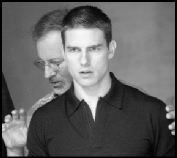TOM CRUISE and Steven Spielberg hit Seattle earlier this month to promote Minority Report, swapping half-hour Q&A sessions between two tables of West Coast newspaper writers. Normally I prefer one-on-one interviews; but a story’s a story, and how often do Hollywood heavyweights visit our hick town?
As Spielberg enters the room, my group of a half-dozen male journalists quickly reverts to high-school typologies: There’s the Name Dropper, the Suck-Up, the Inane Haranguer, the Pretentious Jerk (me), the Silent One (ask no questions, reveal no stupidity), and some guy who didn’t make much of an impression (call him Most Likely to Succeed). And as in high school, all of us compete to please the popular kids with flattery and deference. Spielberg and Cruise seem pretty normal and well-adjusted; by contrast, we journalists are the attention-starved prima donnas.
Having lucked into the favored right-hand position vis-୶is the interview subject, the Inane Haranguer immediately wastes 10 minutes with irrelevant questions, seeking Spielberg’s reaction to the death of Lew Wasserman (whom Haranguer has apparently mistaken for Spielberg’s still-breathing mentor Sid Sheinberg). I want to reach across the table and throttle the guy, yet he does eventually stumble upon a legitimate question: Why did Report appeal to Spielberg?
“The mixing of genres: film noir, mystery, science fiction. I’d never structured a mystery before. That was the most compelling thing for me.” Happy to talk about Hitchcock references, he cheerfully rattles off a list of influences on Report (The Man Who Knew Too Much, North by Northwest, etc.).
Agonizing minutes of terrible questions follow. (“What did you get out of Mr. Cruise on this film?” “A.I. took a lot of people by surprise. . . . ” “Was the scene with the umbrellas inspired by The Umbrellas of Cherbourg?” “Do you think . . . you have a responsibility to introduce [the audience] to a type of filmmaking that challenges them more than the ordinary blockbuster?”)
Pushing my luck, I lob a philosophical query: What about Report‘s notions of free will and predestination? An awkward pause. “Ooh—heavy,” sighs Spielberg, and I am suddenly made to feel the shame of the overeager teacher’s pet who skipped a grade and is deservedly hated by his classmates for it.
“One of the things that made me want to make this movie was the debate between astrology and self-determination,” answers Spielberg. “And that’s really something I’ve thought about my own career and about my own life.” (Meanwhile, my colleagues are thinking, “Let’s get back to the Jacques Demy references.”)
THEN TOM BOUNDS in, flashing his signature smile and famous braces, fashionably unshaven, hair grown out to feathery bangs. He doesn’t seem short (but then, I’m not tall). Again, the Inane Haranguer leads off with his usual incisive line of questioning: “How long have you been trying to wind up in a Spielberg picture?”
This softball allows Cruise to take 15 minutes of batting practice without breaking a sweat. He heaps praise on Spielberg (“He’s incredible”), Stanley Kubrick, Paul Newman, Cameron Crowe, and anyone else he can think of. Ever the dutiful crank, I interrupt the lovefest by asking about his character’s place in an omniscient high-tech police state.
Cruise, a man who knows something about prying eyes, considers the question earnestly: “[L]ook at where we stand today . . . at the threshold of all this technology. And how much should a government take over in terms of our privacies?”
I begin a follow-up about state surveillance gone amok. Here’s where Cruise locks me in his blue-green eyes, causing even this jaundiced interviewer to get a little flustered. (Doh! Did I just say “L. Ron Hubbard” when I meant “Philip K. Dick”?)
Making an honest effort to connect, Cruise continues: “You look at the Internet . . . people have all your information; they go in and raid your computer, and they start sending you marketing information. Today we live in a world where . . . you can get so much information. But a lot of it is worthless information. We’re unfortunately in an era where people read something and they believe it sometimes. Or they don’t believe anything.”
Speaking of worthless information, does anything newsworthy come out of such a press tour? Spielberg and Cruise can’t be faulted for doing their job—they’re acting in good faith, patiently enduring our scattered, self-serving questions. But the net effect is that both sides conspire to produce copy that readers rightfully ignore.
On the way out of the Four Seasons Olympic, my high principles won’t permit me to pick up the little Minority Report gift bag, but now I wonder what was inside. Possibly a better story.








